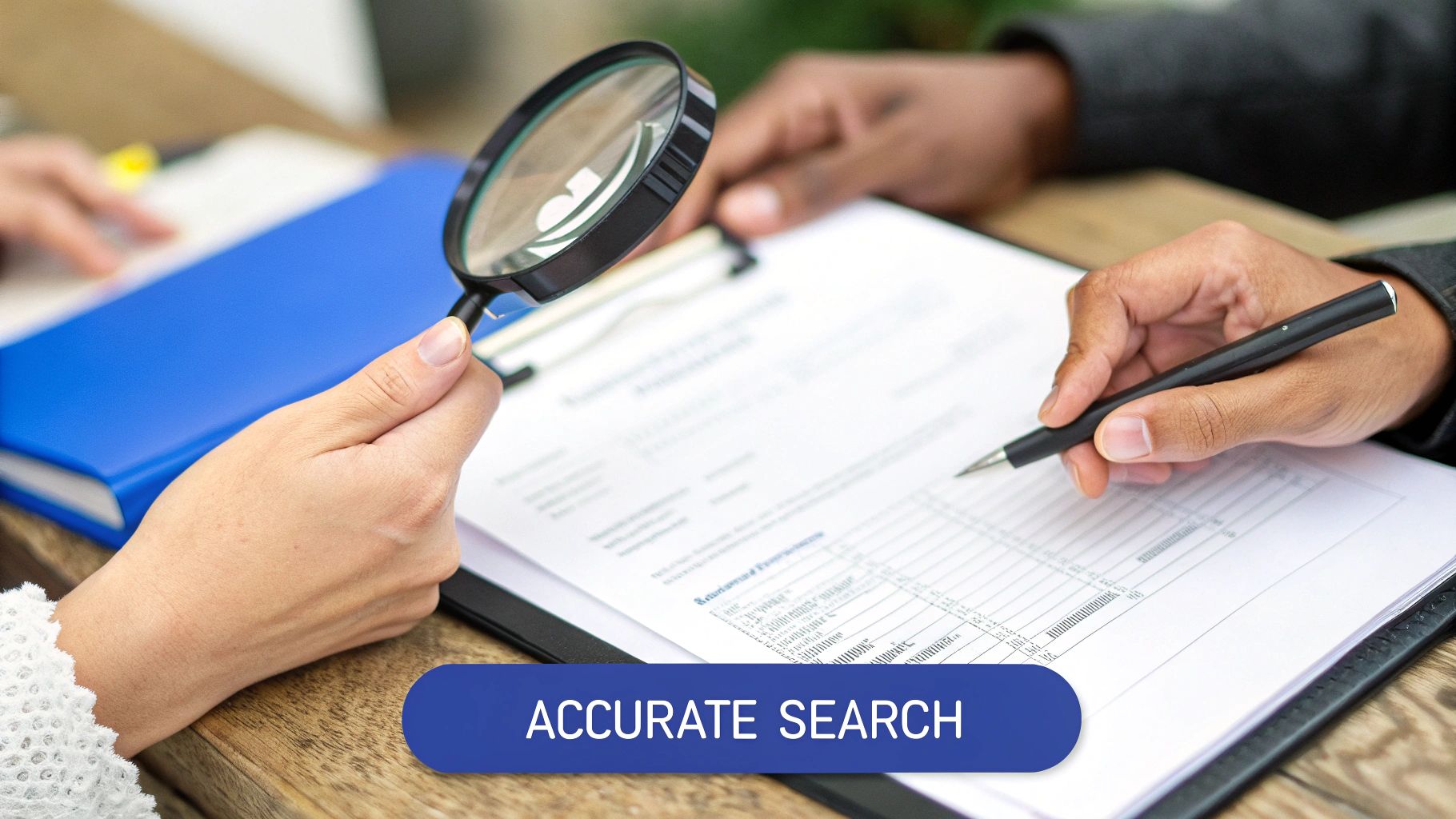Before you ink that deal or welcome a new partner from the British Virgin Islands, hitting pause to conduct a BVI company search is non-negotiable. Think of it as your strategic reconnaissance—a crucial first step to peek behind the curtain and confirm a company's legal standing directly with the official registry. It’s the simplest way to ensure the entity you’re about to do business with is exactly who they claim to be.
Why a BVI Company Search Is a Critical First Step

Let's walk through a real-world scenario. Imagine you're an entrepreneur, and a golden partnership opportunity with a BVI-based firm lands on your desk. The pitch is perfect, the numbers look great. But what if that company was struck off the register six months ago? A quick, straightforward BVI company search is the simple due diligence that separates a savvy business move from a catastrophic mistake.
For small and medium-sized enterprises, this isn't just about corporate governance. It’s about managing tangible risk before you commit your capital, time, or hard-earned reputation.
The Foundation of Due Diligence
Before you dive into any serious business transaction, you need concrete answers to a few fundamental questions. A company search delivers that foundational intelligence, building the confidence you need to move forward with a potential partner or investment.
This initial check helps you:
- Confirm Legitimacy: First things first, does this company actually exist? A search verifies its official registration with the BVI Registry of Corporate Affairs.
- Check Company Status: You’ll discover if the company is in "Good Standing," has been "Struck-off," or is even in the process of liquidation. This is mission-critical information.
- Identify Key Details: The search confirms the exact legal company name, its unique registration number, and the date it was incorporated.
These details might seem basic, but they are your anchor in the vast ocean of international business. The BVI is a major offshore financial centre. To put it in perspective, as of mid-2023, there were 366,050 active BVI Business Companies on the register. That sheer volume is precisely why verifying every detail matters so much. You can explore more BVI company statistics to appreciate the scale of the landscape you're navigating.
Setting Realistic Expectations
It’s just as vital to understand what a standard search won’t tell you. The BVI has built its reputation on robust privacy laws. Consequently, sensitive information like the names of company directors, shareholders, or any financial records is kept confidential and won't appear in a basic search.
This isn’t a flaw in the system; it’s a core feature of the jurisdiction. Our guide on the things you should know about a BVI company dives deeper into this. Knowing this upfront helps you manage expectations and focus your due diligence efforts where they will be most effective.
When you need the official story on a BVI company, your journey begins and ends with the British Virgin Islands Registry of Corporate Affairs. But don’t expect a simple Google-like experience. The Registry operates a tightly controlled, secure system—a key reason the BVI is celebrated for its high standards of privacy and regulatory compliance.
Picture the Registry as a secure vault of corporate information. The master key to this vault is an internal system called VIRRGIN (Virtual Integrated Registry and Regulatory General Information Network). This is the digital heartbeat of all BVI company data, ensuring every record is meticulously managed.
The Authorised Provider Gateway
So, how do you get access? Since the public can't just knock on VIRRGIN's door, the system relies on a network of authorised service providers. These are typically registered agents and professional firms that act as your official conduit. They hold the credentials to submit a BVI company search request directly into the VIRRGIN system on your behalf.
It's a clever setup that achieves two things at once: it fiercely protects the confidentiality of corporate data while ensuring that legitimate requests for public records are handled by professionals who understand the process inside and out.
This diagram illustrates the simple three-step journey your search request will take.
As you can see, the process is designed to be streamlined, using that authorised intermediary to bridge the gap between your query and the official registry data.
What to Expect From the Process
Don't let the "closed system" concept make you think the process is slow. The BVI Registry is remarkably efficient. Because everything flows through VIRRGIN, search requests are processed swiftly, and the information is always current with daily status updates.
This means a single search can pull a wide range of filed documents—from original incorporation details and share capital to transaction histories and the current registered agent. In most cases, you can expect a public company search report delivered to your inbox within 24 hours. You can discover more about BVI Registry access and see a full list of available documents.
This efficiency is part of a broader push towards digitalisation. The Registry is actively developing an online public search function that will eventually provide instant electronic reports, making due diligence even more seamless for global stakeholders.
Gathering Your Intel for an Accurate Search

Before you even think about submitting a search request, the real work begins. The accuracy of your results depends entirely on the quality of the information you provide. Simply having a company name often isn't enough, especially in a popular jurisdiction like the BVI where hundreds of thousands of companies are registered.
It’s a classic needle-in-a-haystack scenario. I once had a client trying to vet a partner they knew as ‘ABC Trading’. They wasted days hitting dead ends because the official registered name was actually ‘ABC Trading Ltd.’. That one tiny suffix made all the difference and stalled their entire due diligence process.
The Golden Ticket to Accuracy
If there's one piece of information you should hunt for, it's the BVI company number. This unique identifier is your golden ticket, slicing through the noise to pinpoint the exact corporate file. It eliminates guesswork and guarantees a match.
Where can you find this number? It’s often hiding in plain sight on documents you might already have.
- Invoices or receipts
- Contracts or formal agreements
- Official company letterheads
Do yourself a favour and check these sources first. Finding that number will save you a world of time and potential headaches, ensuring your search hits the bullseye on the first try.
A BVI company search is a crucial part of any due diligence, but remember it's just one element of a larger strategy. If you're exploring international business structures, getting the full picture is essential. Our comprehensive guide on how to open an offshore company provides that broader context.
As you collect your information, it's also smart to be mindful of how you're gathering it. When researching any entity, it pays to understand the legal landscape surrounding data collection to make sure your methods are above board.
Making Sense of Your BVI Search Report

So, your BVI company search report has landed. It might look like a dense page of corporate jargon, but buried within that language is the intelligence you need. The real skill lies in translating that raw data into a clear picture you can use to make a confident decision.
Think of it as a corporate health check. The report gives you a snapshot of the company's legal and financial pulse at a specific moment in time. It’s not just about ticking a box; it’s about reading between the lines to understand what’s really going on.
Decoding the Company Status
Let's cut to the chase: the most important field is the company's current status. This one piece of information can be the difference between a green light and a full stop on a potential deal.
Here’s a simple breakdown of what you’ll likely see and what it means for you:
- Active / In Good Standing: This is the gold standard. It means the company is current with its government fees and legally authorised to conduct business. It’s your signal to proceed with caution, but to proceed nonetheless.
- Struck-off: This is a major red flag. A company is struck off for failing to pay annual fees or meet other compliance requirements. For all practical purposes, it has no legal standing and cannot enter into new contracts.
- In Liquidation: This tells you the company is being formally wound up. Its assets are being sold to pay debts, and it's on its way to dissolution. It is no longer a viable business partner.
If the status is anything other than "Active," it’s time to pump the brakes and seriously reconsider whether you should be doing business with this entity.
Understanding the Key Players and Details
Beyond the status, the report paints a broader picture. You'll see the Registered Agent, which is the licensed firm in the BVI that serves as the company's official point of contact. Their details are public, which is useful if you ever need to serve formal notices.
The incorporation date is another valuable clue. It tells you exactly how long the company has been in existence, giving you a sense of its history and potential stability. A company formed last week carries a very different risk profile than one that’s been operating for a decade.
A common question I get is about ownership. While the report may show the authorised share capital, it will not reveal who the shareholders are or how many shares they own. Director details are also kept private under BVI law—a key feature of its corporate registry.
To help you get your bearings, let's break down the most common fields you'll see in the report and why each one is important.
Key Fields in a BVI Company Search Report
This table will help you quickly translate the key terms in your report into meaningful information for your due diligence.
| Data Field | What It Tells You | Why It Matters |
|---|---|---|
| Company Name | The full, legally registered name of the entity. | Ensures you are dealing with the correct company, avoiding any confusion with similarly named businesses. |
| Company Number | A unique registration number assigned by the Registry. | This is the most reliable identifier. It's the 'fingerprint' that pinpoints the exact company you're investigating. |
| Status | The current legal standing of the company (e.g., Active, Struck-off). | Instantly tells you if the company is legally able to operate and enter into agreements. This is a critical risk indicator. |
| Incorporation Date | The date the company was officially registered in the BVI. | Provides insight into the company’s age and operational history. A long-standing company may suggest more stability. |
| Registered Agent | The name and address of the licensed agent in the BVI. | Confirms the official point of contact for all legal and corporate matters, verifying its legitimate presence in the jurisdiction. |
By understanding what each of these fields signifies, you can move from just collecting data to actually interpreting it, which is the cornerstone of effective due diligence.
Digging Deeper with Advanced Searches
A basic company profile gives you the essential facts, but what if your due diligence demands a deeper look? For major investments, acquisitions, or high-stakes partnerships, you often need to go beyond the surface to truly manage your risk.
For example, are you concerned that a potential partner might be tangled in legal disputes? You can request a specific search of the BVI High Court Registry. This isn't a mere formality; it uncovers active litigation involving the company, giving you a transparent view of legal risks that could derail your deal.
Uncovering Hidden Debts and Special Cases
Another vital check is a search of the Register of Registered Charges. This is where you discover if a company has secured loans against its assets. Imagine you're planning an acquisition. This search will tell you if the company’s prize assets are already pledged to a lender, saving you from a costly and unpleasant surprise.
Deeper investigation isn't just about spotting red flags; it's about building a complete, accurate picture of who you're dealing with. Fully understanding the importance of due diligence is the only way to truly protect your interests.
It's also worth remembering that the BVI is a massive hub for investment funds. The BVI Financial Services Commission approved 52 new investment funds in the last quarter of 2024 alone, bringing the total to 2,102.
This growth, much of it driven by investors from Hong Kong, highlights why specialised searches are so crucial. Entities like Limited Partnerships or Investment Funds operate under different regulations, and you need to know what you're looking for. You can explore the latest BVI investment fund statistics to get a better sense of the landscape.
Common BVI Company Search Questions Answered
Even with a clear roadmap, a few questions always surface when entrepreneurs and SMEs first dive into BVI due diligence. Let's tackle some of the most common ones to clear up any lingering uncertainties.
One of the first things people ask is, "How much does a BVI company search actually cost?" While the price can vary depending on your provider and the depth of the search, a standard corporate profile is generally very affordable. Think of it as a small, essential investment for invaluable peace of mind.
Another frequent query is about turnaround time. As we've mentioned, the BVI Registry is remarkably efficient. You can typically expect to receive a standard search report within one business day, which is a huge advantage when you're working against the clock.
Can I Perform a Search Myself?
This is a key point of confusion for many. The short answer is no; you can't just log into the VIRRGIN system as a member of the public.
All searches must be channelled through an authorised BVI-based service provider, such as a registered agent or a specialised corporate services firm. This system is designed to maintain the integrity and security of the registry.
What if I Find No Record of the Company?
If a search comes up empty, it usually points to one of two possibilities.
First, the information you provided might have been incorrect—a simple typo in the name or the wrong company number. Second, and more critically, the company may not actually exist on the BVI register. Always double-check your details before jumping to conclusions.
It's important to remember that every offshore jurisdiction has its own unique rules and processes. Gaining clarity on these details is a fundamental part of successful international business structuring.
For more detailed answers, you can also explore our offshore company formation FAQ which covers a broader range of topics that might be helpful.
At Lion Business Consultancy Limited, we provide the clarity you need to move forward with confidence. We act as your private financial manager, translating complex corporate data into actionable insights for your international growth. If you need a trusted partner to handle your due diligence and ensure your next move is a secure one, we’re here to help.

